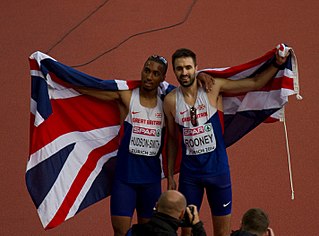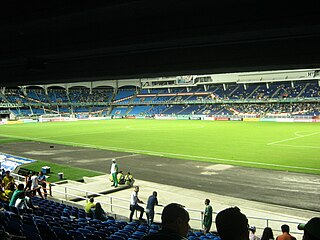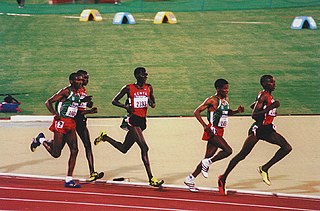
The 2001 European Athletics Junior Championships was an athletics competition for athletes under-20 which was held at the Stadio Olimpico Carlo Zecchini in Grosseto, Italy from 19 – 22 July 2001. A total of 44 events were contested, 22 by male and 22 by female athletes. Two new events were introduced into the programme: the women's 2000 metres steeplechase and the women's 10,000 m track walk. Five new championships records were recorded over the four-day competition, in addition to the two marks set in the newly introduced events.
Winston Short is a retired athlete from Trinidad and Tobago who specialized in the 200 metres and 4×100 metres relay.
Deborah Sue Armstrong is an American former sprinter. Armstrong competed in the 400 metres (heats) of the 1972 Summer Olympics and the 200 metres (semi-final) and the 4 × 100 metres relay of the 1976 Summer Olympics.

Trinidad and Tobago competed at the 2012 Summer Olympics in London, United Kingdom from 27 July to 12 August 2012. This was Trinidad and Tobago's most successful Summer Olympics. It was the nation's largest ever delegation sent to the Olympics, with a total of 30 athletes, 21 men and 9 women, in 6 sports. Trinidad and Tobago's participation in these games marked its sixteenth Olympic appearance as an independent nation, although it had previously competed in four other games as a British colony, and as part of the West Indies Federation. The nation was awarded four Olympic medals based on the efforts by the athletes who competed in the track and field. Javelin thrower Keshorn Walcott became the first Trinidadian athlete to win an Olympic gold medal since the 1976 Summer Olympics in Montreal, where Hasely Crawford won for the sprint event. Marc Burns, a four-time Olympic athlete and a relay sprinter who led his team by winning the silver medal in Beijing, was the nation's flag bearer at the opening ceremony.

The 2002 Ibero-American Championships in Athletics was the tenth edition of the international athletics competition between Ibero-American nations which was held at the Estadio Cementos Progreso in Ciudad de Guatemala, Guatemala on 11 and 12 May. A total of 328 athletes participated in the 44-event programme. The 3000 metres was introduced for both men and women, replacing the longer 10,000 metres event.
Rupert Hoilette is a Jamaican former sprinter who competed in the 1964 Summer Olympics.

Matthew Hudson-Smith is a British track and field sprinter who specialises in the 400 metres. He holds a personal best of 44.48 seconds for the distance set during the semifinals at the 2016 Olympic Games in Rio de Janeiro, where he qualified for the final and finished in 8th place with a time of 44.74.
At the 1934 Far Eastern Championship Games, the athletics events were held in Manila, the Philippines in May. A total of 19 men's athletics events were contested at the competition. The 400 metres hurdles and 4×100 metres relay were contested for the first and only time, replacing the 200 m variants and conforming to the standard Olympic standard. This was the last edition of the games.
The athletics competition at the Africa Military Games was held from 24–26 April 2002 at the Moi International Sports Centre in Nairobi, Kenya.
The 1998 Arab Junior Athletics Championships was the eighth edition of the international athletics competition for under-20 athletes from Arab countries. It took place in Damascus, Syria – the second time the city hosted the tournament, and a fifth hosting for Syria. Damascus also hosted the senior Arab women's championships that year. A total of 41 athletics events were contested, 22 for men and 19 for women. Morocco, a regional power in the sport, did not send a team to the meeting.

At the 1995 Pacific Ocean Games, the athletics events were held at the Estadio Olímpico Pascual Guerrero in Cali, Colombia from June 24 to July 2. A total of 31 events were contested, of which 14 by male and 17 by female athletes. The athletics competition did not attract many of the highest level athletes from the Pacific Rim countries and the host nation athletes were foremost among in the medallists. Colombia topped the medal table with 14 gold medals and 41 medals overall. The United States won the next highest number of gold medals, with four, while Chile had the next highest medal total, with ten.
The 1957 British West Indies Championships was the first edition of the track and field competition between British colony nations in the Caribbean. Held in Kingston, Jamaica, it was supported by retired Olympic sprint medallist Herb McKenley. A total of eighteen events were contested, all of them by men – women's events were not added until two years later.
The 1959 British West Indies Championships was the third edition of the track and field competition between British colony nations in the Caribbean. It was held in Georgetown in British Guiana. A total of 27 events were contested, twenty-one by men and six by women. This was the first time that women had been able to compete at the event. Three new men's events were added to the programme: 3000 metres steeplechase, half marathon, and the 3000 metres walk. The latter two were the first road running and racewalking events to be included.
The 1960 British West Indies Championships was the fourth edition of the track and field competition between British colony nations in the Caribbean. It was held in Kingston, Jamaica. A total of 31 events were contested, twenty-two by men and nine by women. The women's programme was extended with three throwing events. A new men's event was also included: the athletics pentathlon was the first and only time that a combined track and field event was contested at the completion.
The 1964 British West Indies Championships was the fifth edition of the track and field competition between British colony nations in the Caribbean. This marked the relaunching of the competition after a three-year break, during which the West Indies Federation had been dissolved. It was held in Kingston, Jamaica. A total of 25 events were contested, fifteen by men and ten by women. The 400 metres was added to the women's programme. The number of men's events was reduced, with the 10,000 metres, half marathon, pole vault and relay races all being dropped.
The 1965 British West Indies Championships was the sixth and final edition of the track and field competition between British colony nations in the Caribbean. It was held in Bridgetown, Barbados. The dissolution of the West Indies Federation, and the broader sports co-operation it had engendered, left the competition without the support to continue. A total of 28 events were contested, eighteen by men and ten by women. The men's half marathon, pole vault and relay races were all revived for this final edition, although the 3000 metres steeplechase was dropped. Jamaica was the most successful nation, taking seventeen of the titles on offer – it was Jamaica's fourth win at the competition and the only time a host nation did not top the medal table.
The 2004 Arab Youth Athletics Championships was the inaugural edition of the international athletics competition for under-18 athletes from Arab countries. Organised by the Arab Athletic Federation, it took place in Rabat, Morocco from 31 July to 2 August. A total of thirty-nine events were contested, of which 20 by male and 19 by female athletes, identically matching the programme of the 2003 World Youth Championships in Athletics. The girls' programme did not have a steeplechase event.
The 2007 Arab Youth Athletics Championships was the second edition of the international athletics competition for under-18 athletes from Arab countries. Organised by the Arab Athletic Federation, it took place in the Syrian capital of Damascus from 27–29 June. A total of thirty-nine events were contested, of which 20 by male and 19 by female athletes, matching the programme of the 2007 World Youth Championships in Athletics bar the exclusion of a girls' steeplechase event.
Jacqueline "Jackie" Pusey is a Jamaican former track and field sprinter. She competed over distances from 100 metres to 400 metres. She represented Jamaica at the 1976 Summer Olympics and competed a second time at the 1980 Summer Olympics.









